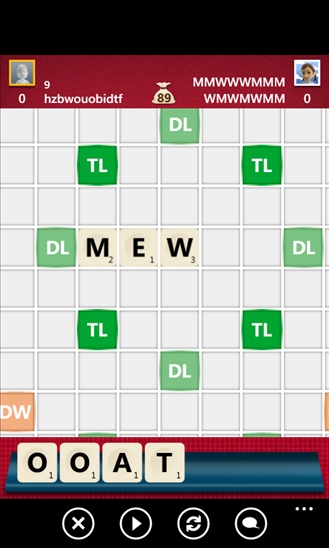In the last few weeks, we have had one notable release (AlphaJax, although it has had a rocky reception), two weeks with no release, and the expectation that we won't see another release before 2013. That's not the way to build up momentum behind a platform.
For existing gamers on Windows Phone, Xbox Live is a 'go to' feature. Yes, there are other games released out there, which are just as good as the Microsoft branded titles (and in some cases, have been promoted from the store up to Xbox Live status), and people continue to explore those games, but the principle of a solid game that has rigorous quality control coming every seven days was a powerful one. It kept people interested in gaming on the move, it saw people return to the Windows Store to see what the new title was, and it created a covenant between the users and Microsoft: "We'll find you good games, you'll always have a trial version, stick with us."


Alphajax and Wordament were both 'promoted' to Xbox Live
People new to Windows Phone are naturally attracted to the Xbox logo, and while they might be a touch disappointed to realise these are not Xbox 360 or Xbox Live Arcade titles that can be downloaded to the home console, they have soon come to realise that the Xbox Live part of Windows Phone is, to a certain extent, a mark of quality and regularity.
To be completely fair, Microsoft have never said in print that they would commit to a weekly schedule of Xbox Live releases, but anyone following the release patterns either through the Windows Store directly, or on sites such as All About Windows Phone and WP Central, must have come to the same conclusion.
For good or for ill, the perception (which in the end is all that counts) is that Xbox Live is weekly. And when there isn't a weekly release, it's both incredibly noticeable and actually damages the whole Windows Phone platform.
Trust is an important commodity in the smartphone world. Users need to trust their phones will work when they pull them out of their pocket; they need to trust that they can do all the things they want to do with their phone; they need to trust the third party developers, networks, and manufacturers will continue to support their device at least through the normal two year contract; and above all they need to trust that Microsoft will maintain Windows Phone at all points in its life cycle.
If the users can't trust what they believe to be a core part of the Windows Phone experience, how can they trust the other elements? Trust is a fragile chain that can easily be broken on a platform.
 Mush made its debut on Xbox Live
Mush made its debut on Xbox Live
So what can the Xbox Live team and Microsoft do? Let's assume that burying their heads in the sand and ignoring this issue is not the way forward. It's all about communication and commitment.
If there is a desire to have a weekly schedule, then publicly say that. It reassures the audience, and it also creates the sense of urgency that a measurable goal puts in place. Take control of the message on games releases, previews, and updates to the apps through a central location, be it blog posts, social media, or other tools. And create a sense of passion in the users of Xbox Live to help evangelise Windows Phone as a gaming platform.
Xbox Live is one of the easiest weapons that Microsoft has to market Windows Phone as a platform. Unfortunately, it's also the easiest to turn on themselves and shoot their own foot off. Let's point it outwards and make 2013 the year when mobile gaming on Windows Phone is something that every user can trust, and can be proud of.
